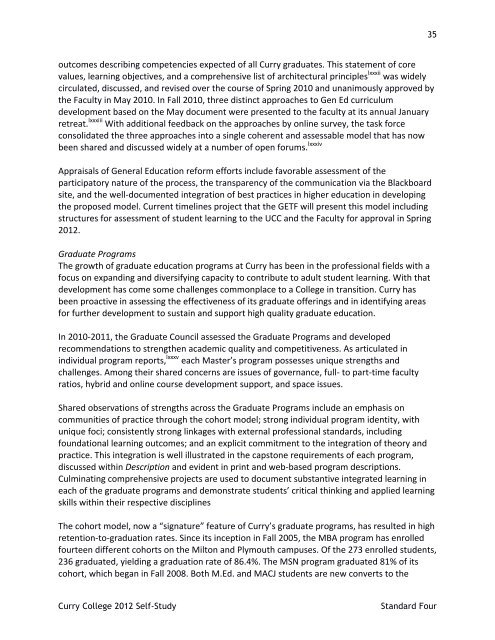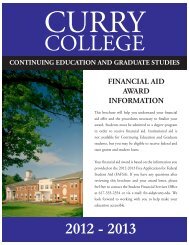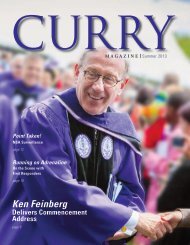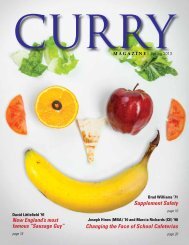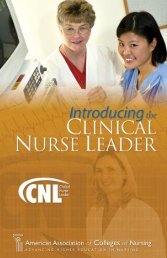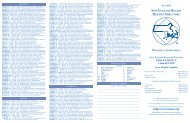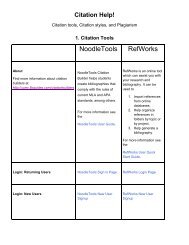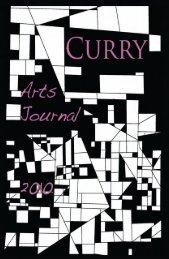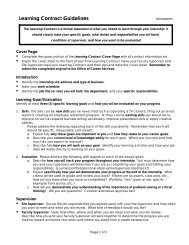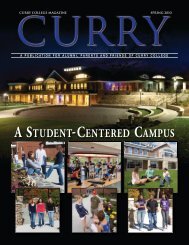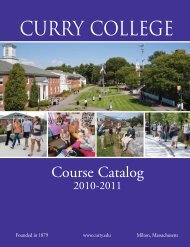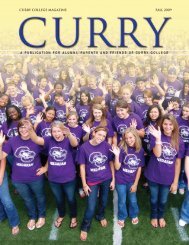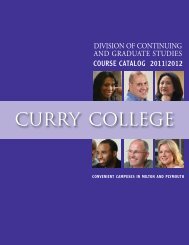Read the Curry College NEASC 2012 Self-Study Report.
Read the Curry College NEASC 2012 Self-Study Report.
Read the Curry College NEASC 2012 Self-Study Report.
Create successful ePaper yourself
Turn your PDF publications into a flip-book with our unique Google optimized e-Paper software.
35<br />
outcomes describing competencies expected of all <strong>Curry</strong> graduates. This statement of core<br />
values, learning objectives, and a comprehensive list of architectural principles lxxxii was widely<br />
circulated, discussed, and revised over <strong>the</strong> course of Spring 2010 and unanimously approved by<br />
<strong>the</strong> Faculty in May 2010. In Fall 2010, three distinct approaches to Gen Ed curriculum<br />
development based on <strong>the</strong> May document were presented to <strong>the</strong> faculty at its annual January<br />
retreat. lxxxiii With additional feedback on <strong>the</strong> approaches by online survey, <strong>the</strong> task force<br />
consolidated <strong>the</strong> three approaches into a single coherent and assessable model that has now<br />
been shared and discussed widely at a number of open forums. lxxxiv<br />
Appraisals of General Education reform efforts include favorable assessment of <strong>the</strong><br />
participatory nature of <strong>the</strong> process, <strong>the</strong> transparency of <strong>the</strong> communication via <strong>the</strong> Blackboard<br />
site, and <strong>the</strong> well‐documented integration of best practices in higher education in developing<br />
<strong>the</strong> proposed model. Current timelines project that <strong>the</strong> GETF will present this model including<br />
structures for assessment of student learning to <strong>the</strong> UCC and <strong>the</strong> Faculty for approval in Spring<br />
<strong>2012</strong>.<br />
Graduate Programs<br />
The growth of graduate education programs at <strong>Curry</strong> has been in <strong>the</strong> professional fields with a<br />
focus on expanding and diversifying capacity to contribute to adult student learning. With that<br />
development has come some challenges commonplace to a <strong>College</strong> in transition. <strong>Curry</strong> has<br />
been proactive in assessing <strong>the</strong> effectiveness of its graduate offerings and in identifying areas<br />
for fur<strong>the</strong>r development to sustain and support high quality graduate education.<br />
In 2010‐2011, <strong>the</strong> Graduate Council assessed <strong>the</strong> Graduate Programs and developed<br />
recommendations to streng<strong>the</strong>n academic quality and competitiveness. As articulated in<br />
individual program reports, lxxxv each Master’s program possesses unique strengths and<br />
challenges. Among <strong>the</strong>ir shared concerns are issues of governance, full‐ to part‐time faculty<br />
ratios, hybrid and online course development support, and space issues.<br />
Shared observations of strengths across <strong>the</strong> Graduate Programs include an emphasis on<br />
communities of practice through <strong>the</strong> cohort model; strong individual program identity, with<br />
unique foci; consistently strong linkages with external professional standards, including<br />
foundational learning outcomes; and an explicit commitment to <strong>the</strong> integration of <strong>the</strong>ory and<br />
practice. This integration is well illustrated in <strong>the</strong> capstone requirements of each program,<br />
discussed within Description and evident in print and web‐based program descriptions.<br />
Culminating comprehensive projects are used to document substantive integrated learning in<br />
each of <strong>the</strong> graduate programs and demonstrate students’ critical thinking and applied learning<br />
skills within <strong>the</strong>ir respective disciplines<br />
The cohort model, now a “signature” feature of <strong>Curry</strong>’s graduate programs, has resulted in high<br />
retention‐to‐graduation rates. Since its inception in Fall 2005, <strong>the</strong> MBA program has enrolled<br />
fourteen different cohorts on <strong>the</strong> Milton and Plymouth campuses. Of <strong>the</strong> 273 enrolled students,<br />
236 graduated, yielding a graduation rate of 86.4%. The MSN program graduated 81% of its<br />
cohort, which began in Fall 2008. Both M.Ed. and MACJ students are new converts to <strong>the</strong><br />
<strong>Curry</strong> <strong>College</strong> <strong>2012</strong> <strong>Self</strong>-<strong>Study</strong><br />
Standard Four


